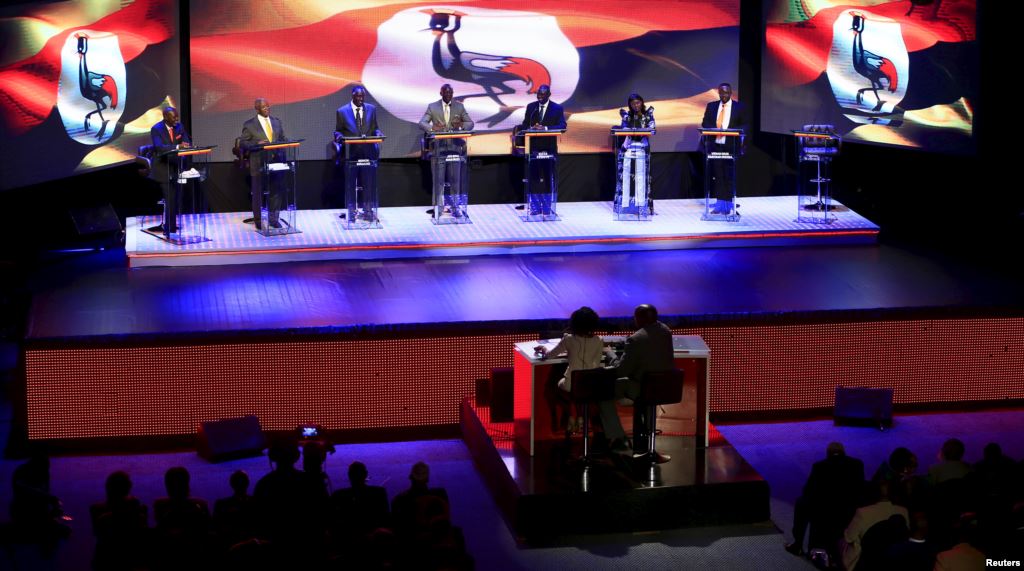 Photo from voanews.com
Photo from voanews.com The debate is the thing, said Canon Justice Ogoola, and I believed him. I developed an appetite for debate years ago in political science seminars at McGill University, and have since followed various elections and too many political TV shows to nurture my passion for persuasion. This week, I was given the chance to learn from the organizing committee of Uganda’s second televised presidential debate when I was hired to (very quickly) help edit and coordinate the production of an informational magazine for the event.
As the sun rises in Kampala with its yellow, orange and blue puckered clouds, and I prepare to fit about a week’s worth of work into today to get this done on time [update: we succeeded. Thanks IRCU, TEFU, UNDP, NCF, designers & printers]...
Let us take a moment to discuss our expectations for the debate on Saturday night.
As the sun rises in Kampala with its yellow, orange and blue puckered clouds, and I prepare to fit about a week’s worth of work into today to get this done on time [update: we succeeded. Thanks IRCU, TEFU, UNDP, NCF, designers & printers]...
Let us take a moment to discuss our expectations for the debate on Saturday night.
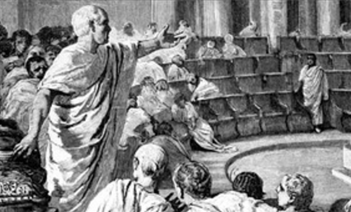 Image from debate.org
Image from debate.org Some background... According to white people’s history, debate started in Athens, Greece, around 800BC, but I wouldn’t be surprised if it actually came from Africa along with humanity. Debating is a test of mental agility, thinking on your feet, and activating impressive communication skills to persuade the audience to see things your way. It is a civil, dignified platform for intellectual gladiators to strike blows at the core of each other’s ideologies, to "win hearts and minds". No vuvuzelas or boda acrobatics here.
What I am curious to find out is whether candidates will really take control of the second debate. As Canon Justice Ogoola (the chairman of the debate organizing committee) kept saying during planning meetings: this is the candidate’s debate, so they must take charge. On the debating stage, it is not unlike taking possession of the ball, to sweep up an opponent’s contradiction and spin it in the air, revealing its inadequacies, then charge toward the goal with the inspirational description of one’s own much-superior idea. Will candidates cross-examine each other? Will they make us believe in their ideological superiority?
What I am curious to find out is whether candidates will really take control of the second debate. As Canon Justice Ogoola (the chairman of the debate organizing committee) kept saying during planning meetings: this is the candidate’s debate, so they must take charge. On the debating stage, it is not unlike taking possession of the ball, to sweep up an opponent’s contradiction and spin it in the air, revealing its inadequacies, then charge toward the goal with the inspirational description of one’s own much-superior idea. Will candidates cross-examine each other? Will they make us believe in their ideological superiority?
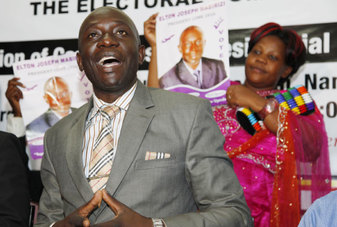 Mabirizi photo from The Red Pepper
Mabirizi photo from The Red Pepper Debates are not just about beating your opponent; they’re also a matter of beating the audience’s expectations of your own performance. Now we know these candidates from the first debate. The candidate with the best chance of beating expectations in this debate is Mabirizi, who was a joker in the last one. If he just memorizes a few great lines and falls into less than three shameful spectacles, I would think he had much improved. Then again, a lot of people I talked to want the joker back... The President, of course, could also win a piece of my heart if he simply showed up! Plus, I believe that most of the topics in this second debate would favour the incumbent, since Uganda has been quite strong on foreign policy and security (rule of law maybe not so much).
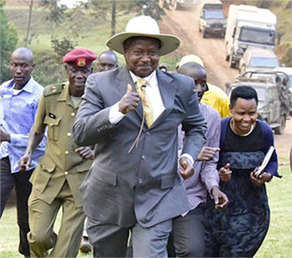 President Museveni "running to the debate." Photo from The Observer.
President Museveni "running to the debate." Photo from The Observer. I am also curious to find out whether these candidates can master the art of brevity. I once heard of a debate technique called “the ten-word answer,” which is meant to appeal to the impatient audience in smart and snappy sound bites. Can these candidates produce short answers that sum up their position with the entertaining ring of a pop-song hook? Can they be quotable, in a good way? Or will they keep bumping up against that 2-minute buzzer? (This reminds me of one of my earlier blogs about preparing for interviews – boiling down the chai).
I also wonder, how will candidates control the topic? Some issues are going to work in each candidate’s favour but not others – like security for the incumbent and corruption for the opposition. The trick is to shift the topic in your favour, no matter the question asked, so that you are battling from an advantageous position. This requires communication skills and intelligence – some training in “block and bridge” techniques would be helpful – and it takes discipline to stay on message.
I also wonder, how will candidates control the topic? Some issues are going to work in each candidate’s favour but not others – like security for the incumbent and corruption for the opposition. The trick is to shift the topic in your favour, no matter the question asked, so that you are battling from an advantageous position. This requires communication skills and intelligence – some training in “block and bridge” techniques would be helpful – and it takes discipline to stay on message.
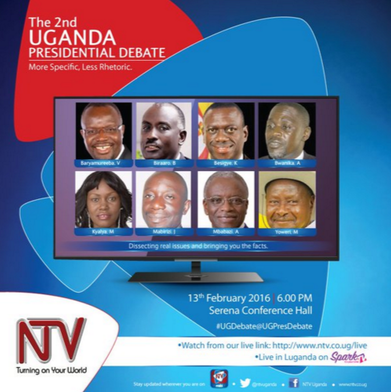
Finally, I wonder how identity politics and social issues will factor in. These are the topics that speak to the heart of the electorate: our religious beliefs, values, families and communities. People are motivated to defend the beliefs that shape their lives, and politicians can use this to their advantage: “vote me and I’ll ban what you believe is bad.” As a Canadian with plenty of gay friends whom I love and respect, I’m curious to see who makes a point of coming out as anti-gay... or how intelligently candidates can link this issue to Ugandan sovereignty or point out contradictions in America’s agenda toward supporting (or ignoring) human rights, freedom and dignity in Africa. Or block and bridge to tourism! Mostly, I hope the candidates will appeal to our compassion and civic responsibility, inspiring a better election.
The debate is the thing, and I am so grateful to be part of this one. I welcome you to share your own expectations of this debate, and what you think will make or break Uganda’s eight presidential candidates.
The debate is the thing, and I am so grateful to be part of this one. I welcome you to share your own expectations of this debate, and what you think will make or break Uganda’s eight presidential candidates.

